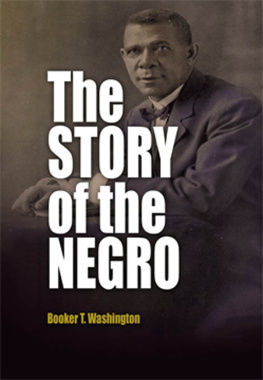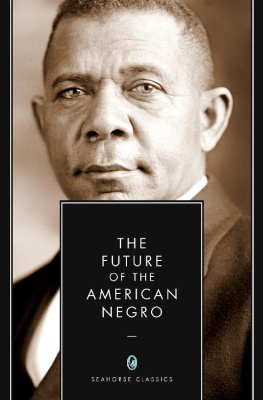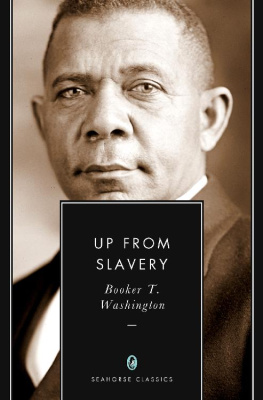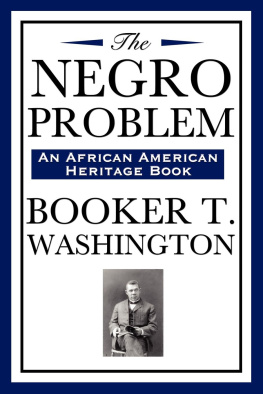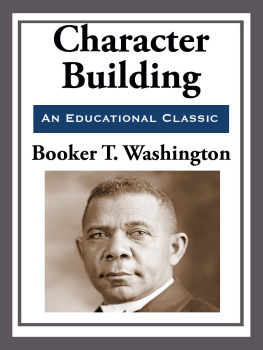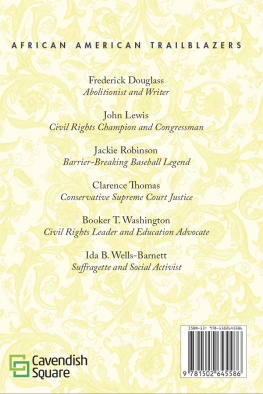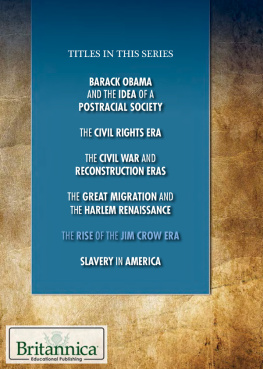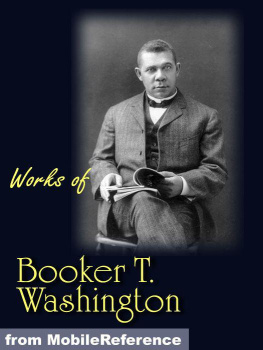Table of Contents
Principal Washington in His Private Office, Tuskegee Institute
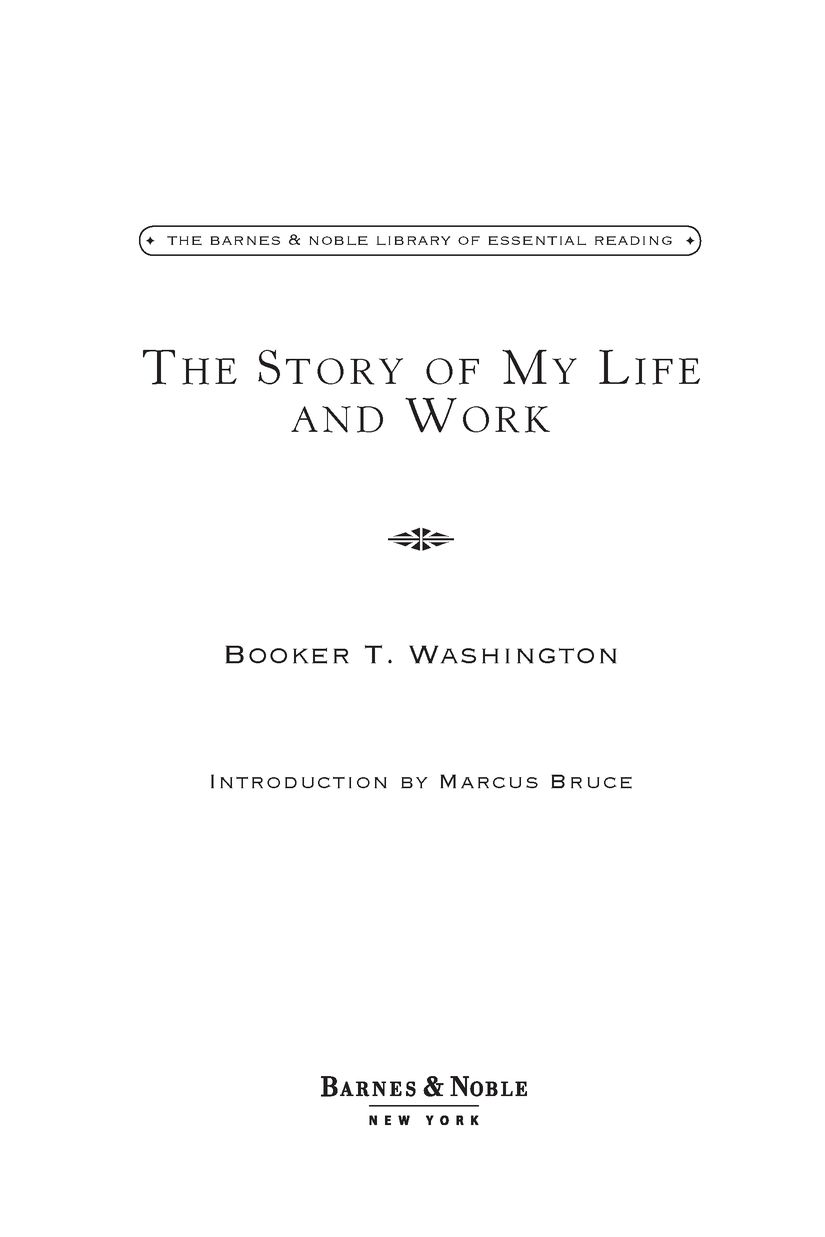
INTRODUCTION
IN THE SUMMER OF 1899, BOOKER T. WASHINGTON VISITED EUROPE FOR the first time and arrived in Paris exhausted. Bearing letters of introduction, he planned to meet with Americans abroad, see the wonders of Paris, and take a long rest from his demanding speaking schedule and fund-raising for Tuskegee Institute. Yet everywhere he turnedthe American University Club, the American Chapel, the home of the American Ambassador to Francehe encountered French and American scholars, politicians, businessmen, abolitionists, and average citizens eager to hear him speak and tell the story of his life. The former slave, now President of Tuskegee Normal and Industrial Institute, had achieved enormous success for a man of forty-five years old and consequently stories of his life, work, and skill as an orator had preceded him. Born into slavery, Washington had earned a college degree, taught at the black freedman college Hampton Institute, gained a national reputation touring the country as an educational lecturer, founded a successful industrial college for African Americans, received an honorary degree from Harvard, and delivered a single speech that was heard across the country and which transformed Americans understanding of their racial problems. Washington was, in the eyes of many, not only the representative of the Negro people, but the best example of what an African American might achieve.
Curious about and fascinated with Washingtons life, the French were anxious to hear how he had overcome the obstacles and challenges faced by other freed men and women. How had he endured slavery? Where had he gained his ability and confidence as a public speaker? Who were the individuals that most influenced him? How did he account for his enormous success and rise as a leader? What gave him the idea of founding a college for African Americans? How could America best solve its racial problems? Yet the question most frequently asked of Washington was: when would he write the story of his life and his work at Tuskegee?
The Story of My Life and Work, published in 1900, just one year after his visit to Paris, was Washingtons response. The lesser known of Washingtons biographical writings, The Story of My Life and Work is often eclipsed by his second and better-known autobiography Up From Slavery, a slave narrative published in 1901 and often classified and discussed with other well-known works of the same genre such as Frederick Douglass Narrative and Harriet Jacobss Incidents in the Life of a Slave Girl. The Story of My Life and Work was something completely different and possessed features that distinguish it as the work of an extraordinary figure in American and African-American history. At the very least, it revealed Washingtons genius for publicizing himself and his work. At its best, it was the story of a man, the educational institution he founded, and the moral vision that shaped both.
By any set of standards, Booker T. Washington was an extraordinary figure in American history. His achievements were considerable, and his life defied the conventional expectations of nineteenth-century African Americans, especially ones who had been enslaved. Washingtons rise to prominence was so remarkable that it led one journalist to ask whether he was a new Negro, someone capable of accomplishments previously thought impossible for African Americans. Yet Washington was more than a curiosity and his success at overcoming the obstacles in his life found wide appeal and approval among the American public. For the many who listened to Washington speak and later read his writings, the story of Washingtons life espoused and put into practice a set of values that most Americans embraced: hard work, discipline, industry, self-reliance, and boundless optimism. What amazed and impressed so many people was how the application of such values had allowed one who had begun life with so little to achieve so much.
Born a slave in Hales Ford in Franklin County, Virginia, on April 5, 1856, Booker Taliaferro Washington was the son of an enslaved African-American woman named Jane and a white American man whose identity was never known. Washington spent the first seven years of his life as a slave and later recalled working, even as a child, on the plantation of James Burroughs. His most vivid childhood memory was the day he and other slaves were gathered together and read the Emancipation Proclamation, a document granting freedom to four million enslaved African Americans. The moment would mark a major turning point in Washingtons life and the beginning of his efforts to define the shape and the substance of his life. The meaning, exercise, and application of freedom would become his life work.
At the age of nine, Washington moved with his mother, brother, and sister to Malden in Kanawha County, West Virginia, where the family resettled with his stepfather, Washington Ferguson. Given the extreme poverty of the family, Washington began working, alternately, in the local salt furnaces and coal mines. During this period Washington also worked for four year as the house servant of Mrs. Viola Knapp Ruffner, a New England woman who set high standards of order, cleanliness, and truth for her domestic workers. She instilled in Washington values that served him well in the years to come and formed the core of his moral philosophy of personal hygiene, self-reliance, discipline, and industry. Eager to learn, Washington also began his formal education during this period, attending a local school for African Americans whenever he could free himself from work. Hard work, a passion for learning, and a sense of missionfeatures of Washingtons early lifewould be central to the message Washington delivered to audiences for the remainder of his life and career.
In 1872, Washington set his sights on attending Hampton Normal and Agricultural Institute, a school created during Reconstruction (1863-1877) to provide technical and industrial training to formerly enslaved African Americans and prepare them to become teachers. Believing manual labor a morally transformative experience and a sign of character, Hampton also provided opportunities for students to pay for their education by working on the campus, a fact confirmed by Washington, who upon his arrival at Hampton, gained admission by meticulously sweeping and cleaning a room. During his three years of study at Hampton Institute, Washington found a mentor and friend in General Samuel Armstrong, a former Union Army officer, Freedman Bureau administrator, and the founder of Hampton Institute, who emphasized educating the whole person (the head, the heart, and the hands) and cultivated a strenuous work ethic in his students. A devout Christian, General Armstrong believed the moral character forged through hard work at Hampton was more beneficial than intellectual acumen and would sustain graduates throughout their lives. In speeches and his autobiographies, Washington would forever extol the virtues and dignity of hard work he had learned at Hampton under Armstrongs tutelage. He also embraced Armstrongs view that economic opportunities, rather than political solutions, would improve the status of African Americans in American society.
Graduating with honors from Hampton, Washington attended Wayland Seminary, a theological school for ministers, for one year and then began teaching freedmen in his hometown of Malden, Virginia. Within two years, General Armstrong called Washington back to Hampton to work as a principal and a teacher in the Hampton Institute night-school program. In 1881, a recommendation from General Armstrong led to Washingtons next position as the first principal of the Tuskegee Normal and Agricultural Institute in Tuskegee, Alabama. The founder and eventually president of the educational institution for the first thirty-six years of its existence, Washington would use an initial $2,000 educational grant from the state of Alabama to transform Tuskegee from a normal school for colored youth into the leading black industrial college in the United States.


